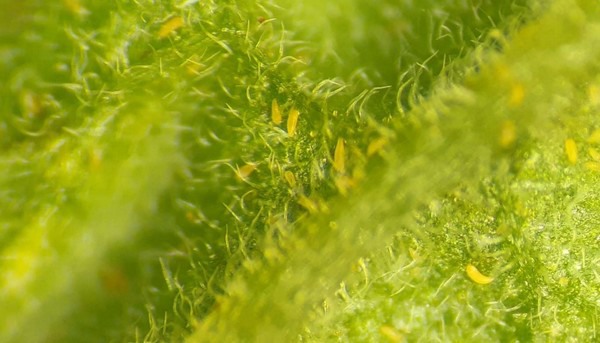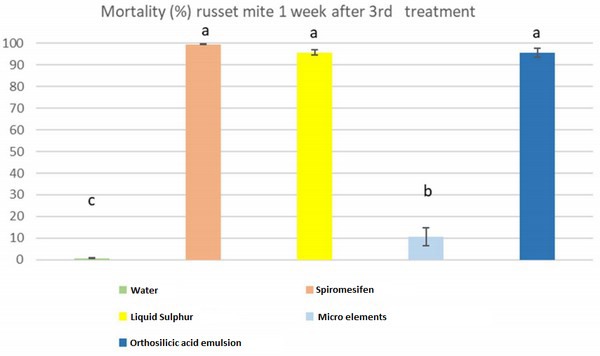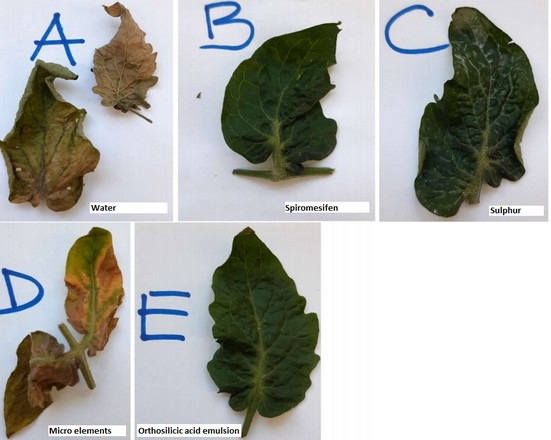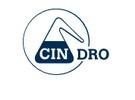Growers are now experiencing a gap between difficult-to-read technical studies, the banning of chemical agents and practice: the need to be able to carry out large-scale production in an efficient and sustainable manner with green resources. In this context, research has been carried out on the resilience of tomatoes to tomato russet mite (Aculops lycopersici).

A russet mite infection, exactly what growers don't want to see
Growers are currently spraying with substances like spiromesifen, abamectin and/or sulfur in order to get rid of russet mite in the crop. However, this does not fit within the call for increasingly cleaner cultivation, from retail and society, according to Thomas Verburg of Cindro Agro Consultancy. They want to help growers cultivate more without harmful substances, so an experiment was requested to see if the crop itself can control tomato russet mite with the right biostimulants.
Tomato russet mite resistance is increasing
The russet mite has over the years become increasingly resistant to spiromesifen, and this insecticide may only be applied a few times. Abamectin, also an insecticide, is highly toxic and is not allowed in the Netherlands and Belgium.
Both substances have an MRL limitation, and sulfur, the third control option, influences the taste of the tomato. All three substances also affect beneficial insects. Various predatory mites of the amblyseius species cannot reach the russet mite due to the sticky gland hairs to which they stick and then die. All these factors combined make the tomato russet mite a pest that is difficult to control.
Helping the crop’s defense mechanisms
A crop will be stressed quickly, also because there is a continuous demand for maximum performance. An infestation only makes it worse. That is why at Cindro the idea arose that it might be possible to make progress by maintaining a healthy crop defense mechanism. "This is characterized by the active production of antibodies, such as salicylic acid and jasmonic acid," explains Thomas. "The right nutrition and conditions allow a crop to better organize its own defenses. This principle is very complex, but there are advantages."

Russet mite reduction four weeks after infection
Testing
Crop tests have been carried out at Wageningen University & Research regarding the development of the population of tomato russet mite on tomato plants. The test consisted of an untreated group, two chemical crop protection product references and groups treated with biostimulants that affect the resilience.
The tests were repeated four times. In a group treated with a biostimulant based on a food-grade orthosilicic acid emulsion, every week fewer russet mites were found. At the end of the test period, the plant was virtually free of russet mite with no visible damage, while the untreated reference was completely affected.

Leaf photos after three weeks of russet mite infection
Follow-up tests
"This leads us to the hypothesis that there seems to be an opportunity to increase crop resistance to such a level that the crop can control the presence of russet mite (Aculops lycopersici)," Thomas concludes.
Cindro Agro Consultancy will conduct follow-up tests and, with the additional knowledge, 'will be able to advise a good IPM strategy' to growers. If you would like to receive more information about the test or what Cindro Agro Consultancy can do for crop resistance in your greenhouse, please contact t.verburg@cindro.nl.
For more information:
Cindro Agro Consultancy B.V.
Thomas Verburg
t.verburg@cindro.nl
